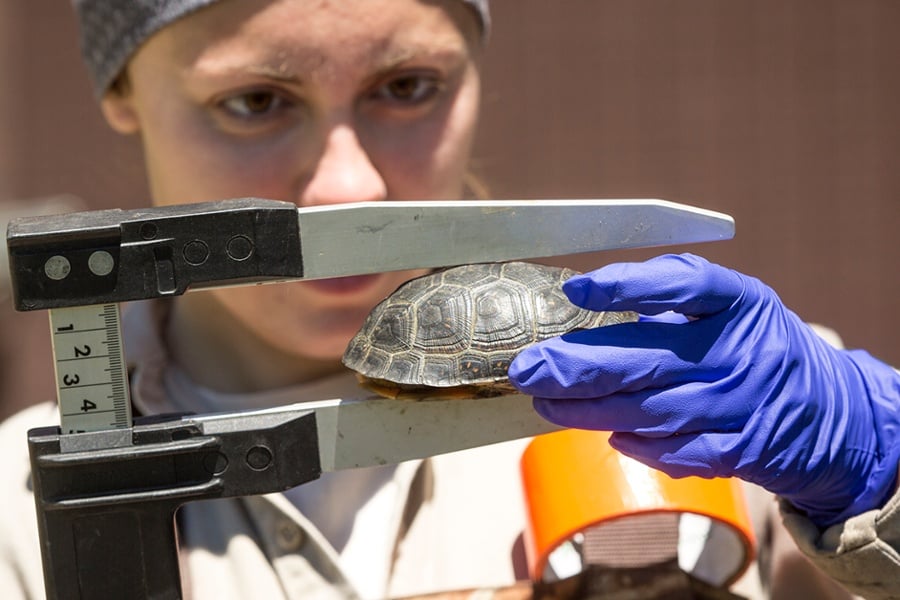
Participatory Education Programs
The Forest Preserve District offers problem-based programs that offer hands-on learning in natural sciences both in the classroom and the field. These programs are structured to meet science learning standards through an extended curriculum that includes real-world science.

Participatory Education
Transform your science curriculum into hands-on learning with this aquatic conservation program. On behalf of the forest preserve district’s Urban Stream Research Center, your classroom will raise native fish that serve an important role in supporting the most imperiled aquatic organisms in our community – freshwater mussels. Exploring fish and mussel lifecycles and food chains will enhance students’ understanding of the importance of these often-overlooked aquatic animals to their ecosystem. Students will investigate the complexity of aquatic ecosystems and how humans impact river health.
Teachers will be provided with specific guidelines for the health and well-being of the fish, as well as optional activities and lesson plans. Teachers are encouraged to incorporate the fish into their curriculum to foster creativity and scientific exploration and support social-emotional learning.
Recommended grade levels 4 to 12.
The program begins in January/February and concludes in May. Space is limited.
Teachers new to Bass in the Class in spring 2026 must attend the new-teacher training and informational session in fall 2025. Click here to be notified when registration opens for the fall 2025 training.
Problem-Based Learning
Partner with a Forest Preserve District wildlife ecologist and naturalists to determine the suitability of a potential forest preserve site to release state-endangered Blanding’s turtles in a program specially geared towards junior and senior high-school AP environmental science or biology students. A naturalist will visit your classroom to provide insight about the Blanding’s turtle's natural history, factors that contribute to its decline and District-led recovery efforts.
Then, visit a DuPage forest preserve in September or October to complete field work and collect a variety of data to support a claim about the suitability of releasing Blanding’s turtles at that site. Students will present their conclusions to a panel of experts and discuss their findings. For 30 - 60 students. $10 per student. A minimum program fee of $300.
Standards Explored
NGSS
- HS-LS2-7 Ecosystems: Interactions, Energy, and Dynamics
- HS-LS2-8 Ecosystems: Interactions, Energy, and Dynamics
- HS-LS4-5 Biological Evolution: Unity and Diversity
Outreach
The Forest Preserve District will deliver an interactive outreach exhibit for large student audiences at your school's STEM, science, or career fair. View the available outreach exhibits and descriptions below. Then, click the green button to reserve an exhibit.
Forest Preserve District experts will meet your students in-person for a career outreach event. Students can ask questions and learn about the different career opportunities at the Forest Preserve District. Experts may bring along real equipment from their career field.
Careers
Ecologist
Farming
Forest Preserve Ranger
History and Museum
Naturalist
Natural Resources Management
Outdoors STEM Careers
Wildlife Rehabilitation
Native freshwater mussels are important natural purifiers of water and serve as indicator species about the health of an aquatic ecosystem. The Forest Preserve District propagates native freshwater mussels at its Urban Stream Research Center at Blackwell Forest Preserve.
This exhibit highlights the science behind our propagation efforts, featuring the biology and life-cycle of mussels, the technology used to count and track lab-raised individuals, and the engineering processes of various aquatic-housing systems. Hands-on activities include:
- Examination of mussel specimens
- Use of a microscope to count baby mussels
- Exploration of mussel larvae to host fish
Standards Explored
NGSS
- K-ESS3-1 Earth and Human Activity
- K-ESS3-3 Earth and Human Activity
- 1-LS3-1 Heredity: Inheritance and Variation of Traits
- 2-LS4-1 Biological Evolution: Unity and Diversity
- 3-LS1-1 From Molecules to Organisms: Structures and Processes
- 3-LS3-2 Heredity: Inheritance and Variation of Traits
- 3-LS4-4 Biological Evolution: Unity and Diversity
- 4-LS1-1 From Molecules to Organisms: Structures and Processes
- 5-LS2-1 Ecosystems: Interactions, Energy, and Dynamics
- 5-ESS3-1 Earth and Human Activity
- MS-LS2-4 Ecosystems: Interactions, Energy, and Dynamics
- MS-ESS3-3 Earth and Human Activity
- HS-LS4-5 Biological Evolution: Unity and Diversity